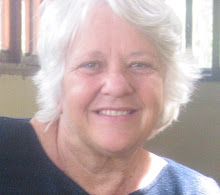

Miles walked:
3/14 5 miles at the beginning of Highway 11, just east of New Orleans
3/15 9 miles from Slidell to Pearl River, LA
3/16 10 miles from Picayune to McNeill, MS
3/17 9 miles from McNeill to Derby, MS
3/18 6 miles from Derby to Poplarville, MS
3/19 recess in Lumberton to recover from staph infection in toe
In August, 2005, after leaving the coast, Hurricane Katrina raged up Highway 11 (as the locals call it) wreaking damage, blowing off roofs and felling trees and posts. The aftermath was brutal: no electricity for weeks, difficult communications, impassable roads, and suffocating heat. "My two little children stopped eating when the heat got up to 105°," a woman in a little diner told me. Another woman who invited me into her home and showed me photos of Katrina's damage told me that the fish in her pond all died because of the heat.
This is what climate change will bring to millions in the vulnerable coastal areas around the world.
People are still rebuilding their homes, those that can. But along the road I see many vacant buildings, both homes and businesses. One man told me that a huge tree fell on his house, just eight inches from where his wife was sitting. "I spent $70,000 to rebuild my home, but if we get hit again I won't rebuild. I'll buy a mobile home for $4,500." A couple told me that the storm picked up their house, twisted it and put it down again totally destroyed. They couldn't afford to fix it so they've moved in with his mother, in her dilapidated mobile. They invited me in for a shower and a St.Patrick's Day dinner of cabbage and ground beef with hamburger helper. I parked in their yard and they set my van up with electricity. Fresh coffee in the morning before they set off to fish for catfish and I started out on my first walk of the day.
You don't talk to these folks about a vegetarian diet. Steak, fried chicken, catfish are deeply ingrained comforts they're not ready to give up; not now when life is so hard. I noticed that people smoke a lot, especially the women. Obesity is a problem, along with diabetes, high blood pressure, strokes. They might try to raise a few vegetables, maybe some strawberries, but it isn't easy in the heat and with all the insects.
And except for someone as crazy as me, walking isn't an option. Villages are far from each other and homes spread widely through the countryside. The roads have no shoulder, just a thin strip of pavement outside the lanes where the vehicles barrel by. (I step aside, into the grass, every time a vehicle approaches. This slows me down, of course, and I watch my step because I've seen snake carcasses along the road, as well as other roadkill; armadillo, nutria, possum.) Everyone around here has a car, mostly SUVs and large pickup trucks. There are no buses, no public transportation. The Amtrak train blows its whistle every morning as it speeds by to Hattiesburg, Birmingham and north. The local people are utterly dependent on oil.

No comments:
Post a Comment